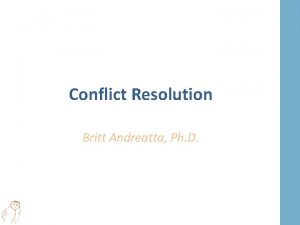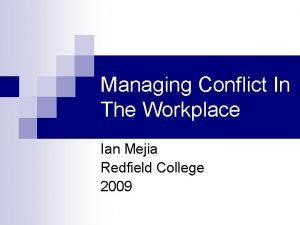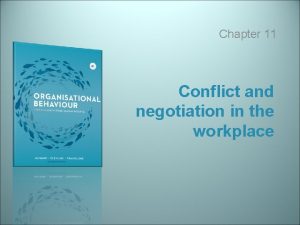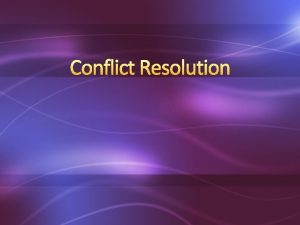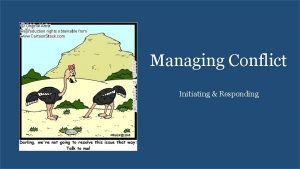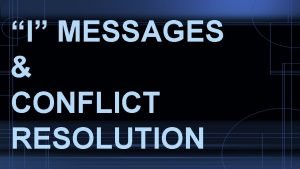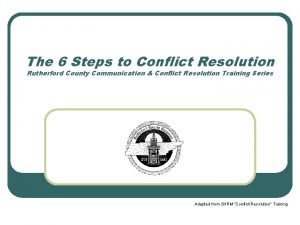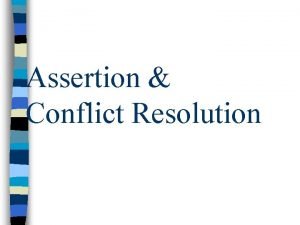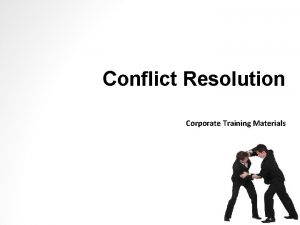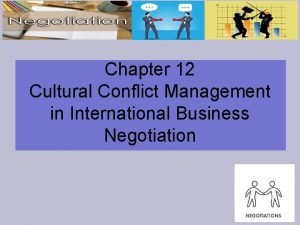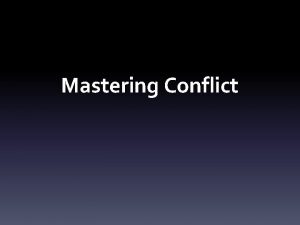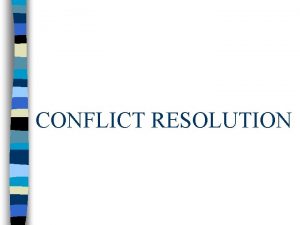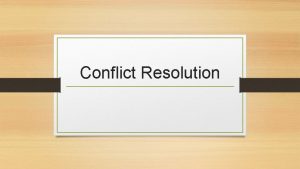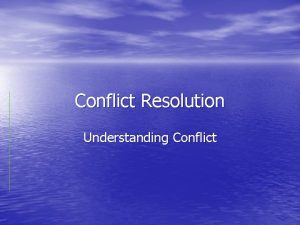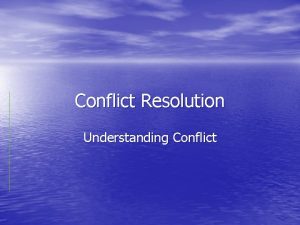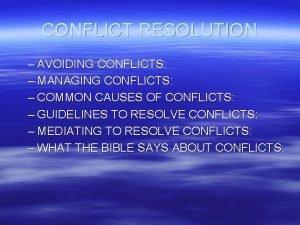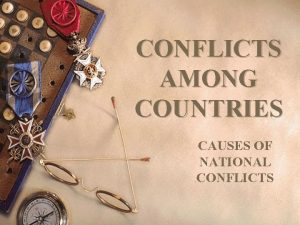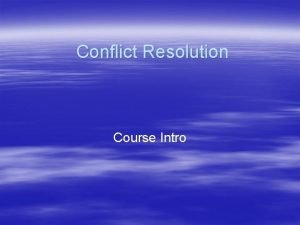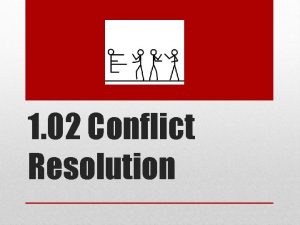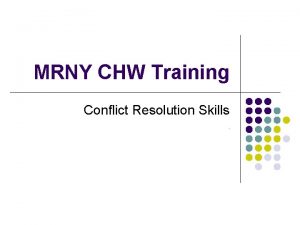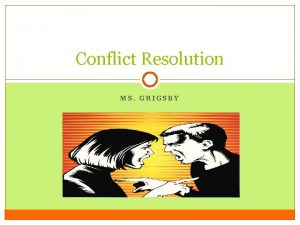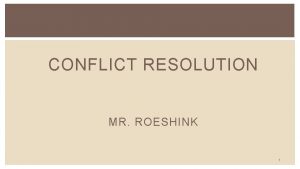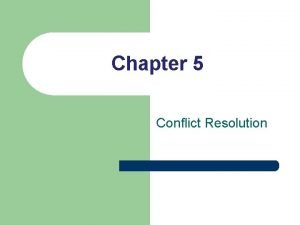Workplace Conflict RESOLUTION Sources of Conflicts originate from

















- Slides: 17

Workplace Conflict RESOLUTION

Sources of Conflicts originate from a variety sources and contain many different qualities. Conflicts, therefore, may also require variety of approaches, and be more or less difficult to resolve. Hence the old adage; “If the only tool that you have is a hammer, everything starts to look like a nail” 4/14/2015 CAHRMA Conference Presentation

Sources of Conflict • Communications conflicts - misunderstandings, lack of information, assumptions, differences in perspective, misinformation, and ambiguities. • Structural Conflicts - ineffectual processes, time constraints, inappropriate structure, organizations, social structures and systems. • Relationship Conflicts - stereotypes, distorted perceptions, unmet expectations, fear, use of power, history. • Interest Conflicts - perceived or actual incompatibility of needs and interests, differences in preferences, style, ways of doing things, differences in emotional needs, etc. • Value conflicts - Opposing beliefs, values, philosophies, worldview. 4/14/2015 CAHRMA Conference Presentation

Ways to Approach COMMUNICATION CONFLICTS • • 4/14/2015 Define terms Clarify assumptions and expectations Check interpretation of information Develop criteria for determining relevant information CAHRMA Conference Presentation

Ways to Approach STRUCTURAL CONFLICTS • Design process to satisfy both parties • Adapt deadlines and timelines where possible • Check whether structure is causing problems • Analyze context within which the conflict occurs 4/14/2015 CAHRMA Conference Presentation

Ways to Approach RELATIONSHIP CONFLICTS • Show concern for others point of view • Remain non-defensive and non judgemental • Keep emotions in check, share stories and other information that helps others see you as reasonable and friendly • Use power equitably • Speak to the history and ways to move past it 4/14/2015 CAHRMA Conference Presentation

Ways to Approach INTERESTS, CONFLICTS • De-emphasize positions • Seek and offer information about, motivations, fears, and goals underlying each persons attitudes, words, actions and stances • Collaborate when differences can be accommodated and compromise when differences are incompatible 4/14/2015 CAHRMA Conference Presentation

Ways to Approach VALUES CONFLICTS • Seek and offer information about beliefs and values • Look for common goals and values • Acknowledge value differences and try to resolve the conflict in ways that respect the differing value systems 4/14/2015 CAHRMA Conference Presentation

Forms of Dispute Resolution Alternative Dispute Resolution Spectrum • “Conflict Resolution” is a broad term used by professionals involved in this field, the following are some specific forms of dispute resolution. • Third party intervention and control increases as one moves from negotiation to adjudication 4/14/2015 CAHRMA Conference Presentation

Negotiation • Disputing parties agree to resolve their problem by talking about their concerns face to face and working together to find a solution that is mutually acceptable. • NOTE: • It is in this form of intervention that the disputants maintain the greatest degree of control 4/14/2015 CAHRMA Conference Presentation

Coaching • A “coach” is a third party who encourages the disputing parties to solve their problem. For example s/he may make suggestions on how to approach the other party to the conflict help the person understand his/her underlying interests or act as a “go between”. • NOTE: • This may be the initial intervention of a supervisor or Human Resources staff member 4/14/2015 CAHRMA Conference Presentation

Mediation • Mediation is a voluntary, co-operative problem solving process in which a person acceptable to the disputing parties assists them in clearly defining the issues in the dispute and helps them work toward a mutually agreeable resolution to the dispute. • NOTE: • The mediator has the primary responsibility of guiding them through the process, the disputants maintain primary responsibility for the resolution of their conflict. • Typically a mediator comes from outside the direct organization of the disputants 4/14/2015 CAHRMA Conference Presentation

Positions and Interests Positions Issue of concern Fixed solutions, demands Interests Fears, Needs, Concerns, Wants, Hopes Common Interests

4/14/2015 CAHRMA Conference Presentation

4/14/2015 CAHRMA Conference Presentation

Arbitration • An arbitrator is a person appointed by two disputing parties to settle their dispute. In arbitration the third party makes a judgement after hearing both sides of the dispute. NOTE: • In arbitration the disputants no longer have final decision making power 4/14/2015 CAHRMA Conference Presentation

Adjudication • The civil and criminal courts are well established as a form of dispute resolution in North America, to the point that they have become the most well known method, although not necessarily the most effective method of dispute resolution. • NOTE: • In adjudication disputing parties are usually represented by lawyers, and as a result, have minimal control 4/14/2015 CAHRMA Conference Presentation
 What is conflict and conflict resolution?
What is conflict and conflict resolution? Explain important of watershed management
Explain important of watershed management Print and web sources
Print and web sources High resolution low resolution
High resolution low resolution Stress and conflict introduction
Stress and conflict introduction Intergenerational conflict in the workplace
Intergenerational conflict in the workplace Overt and covert conflict in the workplace
Overt and covert conflict in the workplace Conflict and negotiation in the workplace
Conflict and negotiation in the workplace Sources of conflict
Sources of conflict Initiating conflict
Initiating conflict What are i messages
What are i messages Six steps of conflict resolution
Six steps of conflict resolution Passive conflict resolution
Passive conflict resolution Staben conflict resolution
Staben conflict resolution Conflict resolution training materials
Conflict resolution training materials Center for conflict resolution kansas city
Center for conflict resolution kansas city Conflict resolution in international business
Conflict resolution in international business Conflict norming exercise
Conflict norming exercise
